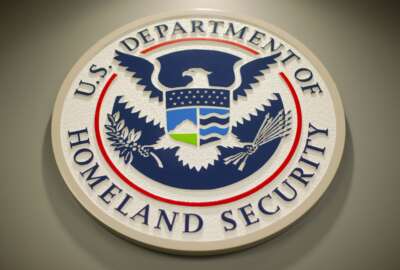Postal Service agrees to provide more transparency during election season
In today's Federal Newscast, the Postal Service settles another lawsuit stemming from the 2020 presidential election.
To listen to the Federal Newscast on your phone or mobile device, subscribe in PodcastOne or Apple Podcasts. The best listening experience on desktop can be found using Chrome, Firefox or Safari.
- The Postal Service settled another lawsuit stemming from the 2020 presidential election. USPS agreed to publish election mail and mail-in ballot guidance on its website ahead of primary and general elections through 2028. USPS also agreed to meet with states’ attorneys general to review its election mail performance and provide weekly on-time delivery data. Pennsylvania led five other states and the District of Columbia in the lawsuit. The settlement is similar to how USPS resolved another lawsuit led by the NAACP and Public Citizen. (Federal News Network)
- Federal law enforcement officers may see changes to their retirement savings over split annuities. Currently, basic annuity and annuity supplements are calculated the same way for federal officers. That lets former spouses of divorced officers receive a portion of their annuity supplement. Two senators on the Homeland Security and Governmental Affairs Committee are looking to clarify the rules. James Lankford (R-Okla.) and Kyrsten Sinema (D-Ariz.) have reintroduced a bill that would require a court order or similar process for former spouses to actually receive those payments.
- Lawmakers are pressing the Department of Homeland Security’s inspector general on reports that he suppressed findings of domestic abuse and sexual harassment by DHS employees. House lawmakers are asking Inspector General Joseph Cuffari’s office for documents associated with an unpublished report on sexual harassment at DHS law enforcement components. House Oversight Committee Chairwoman Carolyn Maloney (D-N.Y.) and Homeland Security Committee Chairman Bennie Thompson (D-Miss.) said they’re troubled by reports that Cuffari’s office sought to remove findings from the draft report, as well as another already published report on domestic abuse. The lawmakers want answers from the IG by May 24.
- The Environmental Protection Agency is delaying plans to close a lab in Houston after shuttering other facilities. The EPA tells employees it’s pushing back plans to relocate staff in Houston to another facility about 400 miles away in Ada, Oklahoma. The agency, at first, planned to relocate employees no later than 2023, but is now pushing those plans back to 2027. The relocation would affect about 30 EPA lab employees and 11 contractor employees. The EPA has closed other regional labs over the past few years, including in Richmond, California, Grosse Ile, Michigan and Las Vegas. (Federal News Network)
- The Defense Department may be rethinking how it classifies space programs. Since the inception of the Space Force, some military officials have complained that too much classification has been an issue for connecting with new businesses. DoD’s top space official said the Pentagon is now considering changing how it classifies space programs and working with Congress if needed.
- The Navy said its fleet is too small for its mission, but is the mission reasonable? The chief of naval operations said the service’s fleet is too small to handle two simultaneous major conflicts at once. The Navy currently has about 300 ships. Adm. Michael Gilday proposed expanding the Navy to 500 ships. However, many lawmakers questions whether the United Stated needs to be prepared for a two-front war given the current landscape. The Defense Department is currently revamping its National Defense Strategy, which could lower the bar for what the military needs to be responsible for.
- At least a handful of military academy students are facing serious financial ramifications over their refusal to get vaccinated against COVID-19. The Air Force Academy said it has four cadets who refused vaccines, because of which they would be blocked from graduation and becoming commissioned officers. But a spokesman said their status could change between now and graduation day as they “weigh the consequences.” Air Force officials said the cadets could also be required to repay hundreds of dollars in tuition costs. The final decision would be up to the Secretary of the Air Force. Officials at the Army and Navy service academies said they have no graduating students who refused COVID vaccines. (Federal News Network)
- Six weeks after pausing the $50 billion small business contract known as Polaris, the General Services Administration is out with suggested changes. Small businesses have a chance to weigh in on the changes GSA wants to make to the Polaris solicitation. GSA released draft updated language Friday, as part of its decision to rethink the requirements for mentor-protégé and joint venture bidders. GSA, which worked with the Small SBA on the draft changes, is asking protégé’s to provide a minimum of one primary relevant experience project or emerging technology relevant experience project. The mentor can provide no more than three primary relevant experience projects. The original RFP didn’t require the protégé to provide any examples of relevant experience. Vendors have until May 23 to provide comments. (Federal News Network)
- Agencies spent $420 billion in fiscal 2021 on common goods and services that fall under the governmentwide category management initiative. That was $20 billion more than in 2020 despite fewer awards and contracts. The Government Accountability Office said category management is one of several acquisition areas where agencies could make more progress to reduce costs and duplication. GAO said in its bi-annual report on duplication across government that the Office of Management and Budget needs to address agencies’ data management challenges and establish additional performance metrics to help achieve more cost savings, as well as potentially eliminate duplicative contracts.
- Agencies and industry are charting a path forward to secure open source software. The Linux Foundation and the Open Source Software Security Foundation said the plan is backed by about $150 million in industry funding over the next two years. Goals include increasing the security of open source production, improving vulnerability discovery and remediation, and speeding up the time it takes to patch systems. The White House, the Cyber Security and Infrastructure Security Agency, and other agencies helped develop the plan.
- A new appointee is heading to the Merit System Protection Board. Tiffany Lightbourn will join MSPB as director of policy and evaluation at the board’s headquarters. In the role, Lightbourn will lead non-partisan studies that evaluate the board’s policies and programs guiding federal workforce cases. The Office of Policy and Evaluation at MSPB regularly shares its findings and recommendations with the White House, Congress and other stakeholders. Before joining MSPB, Lightbourn served as director of human resources shared services at the IRS.
Copyright © 2025 Federal News Network. All rights reserved. This website is not intended for users located within the European Economic Area.
Eric White
Eric White is news anchor and Federal Drive producer at Federal News Network.
Follow @FEDERALNEWSCAST
Related Stories
DHS reviewing misconduct discipline processes after unpublished IG reports come to light
Related Topics
2020 election
Agency Oversight
Air Force Academy
All News
COVID-19 vaccine
COVID-19 vaccine hesitancy
COVID-19 vaccine mandate
data management
Department of Homeland Security
Environmental Protection Agency
Federal Drive
federal law enforcement
Federal Newscast
fleet management
General Services Administration
Government Accountability Office
Joseph Cuffari
Management
Merit Systems Protection Board
NAACP
National & World Headlines
Open Data/Transparency
Open source software
Polaris
Postal Service
Public Citizen
sexual harassment
Small business contracting
Space Force
Technology
Tiffany Lightbourn
Tom Temin
Workforce






